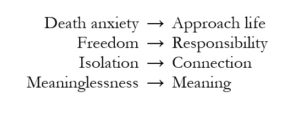
Four Existential Givens (and the implied responses)
So, Yalom (e.g., 1980) talks about the four “existential givens” or “ultimate concerns”:
- Death (i.e., death anxiety)
- Freedom
- Isolation
- Meaninglessness
And I’m surprised how rarely (or if ever?) I find someone cogently and overtly expressing that the implied responses to each of these ultimate concerns are the bedrock principles of existential therapy (and maybe ALL therapy):
- Approaching (rather than avoiding) anxiety (thus reducing anxiety and also the foundation for living fully)
- Taking responsibility (and recognizing limits of both responsibility and freedom)
- Building and maintaining connections (maybe Existential Therapy proper doesn’t do a great job of this one, but Frankl certainly talks about it at least)
- Defining (and then living in) valued directions
See what I mean, though? Why is this not just a chart in all theories textbooks? Why do we always get the idea that the main things to do is SUFFER with these ultimate concerns rather than use them as guideposts?!

Comment below: From your own theoretical orientation, how do these play out? Is anything missing?
Yalom, I. D. (1980). Existential psychotherapy. New York: Basic Books